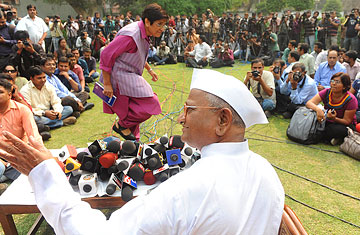
Anna Hazare, whose campaign for a new anticorruption law galvanized millions of Indians in August, talks to journalists in New Delhi on Nov. 4, 2011
After 19 days of silence, Indian anticorruption crusader Anna Hazare found he had something to say in the early hours of Friday in New Delhi. He had arrived in the city the previous day to take part in consultations on the final draft of the anticorruption bill, which is expected to be passed in the winter session of Parliament beginning the last week of November. Hazare had undertaken his vow of silence — the maun vrat, an ancient Indian soul-cleansing exercise — during a crucial period that saw a dip in popular support for his movement in the face of various allegations of financial irregularities against some of his closest aides.
The 74-year-old activist, who has been writing a blog for the past few weeks to communicate with his followers, broke his vow on Friday to meet with "all those young men and women, farmers, working class [people], school children from all over the world who were a part of this movement against corruption." Hazare's blog statement underlines the growing fears among his team that they may be losing the backing of the middle class, who had earlier played a defining role in sending the government scampering for a compromise with Hazare on the anticorruption bill. The big question is: Will the break in Hazare's silence be enough to win back the support he so desperately needs?
When Hazare went on a 12-day fast in August to demand a strong ombudsman to curb corruption in the country, thousands of Indians turned out each day to show their support. The honesty and integrity of Team Anna — a group of people known for their social-service acts who came together behind Hazare — was much played up. However, two months down the line, Team Anna is battling the same demon of corruption that it had vowed to root out from India.
The revelation that harmed the movement the most was an exposé in October by the Indian Express against Kiran Bedi, a close associate of Hazare's and a former police officer. The paper claimed that on several occasions when Bedi was invited by organizations for public-speaking engagements, she charged them for business-class tickets but actually flew on economy. Bedi doesn't deny the allegations but maintains that the excess money went to benefit the poor. Arvind Kejriwal, one of the main architects of Hazare's movement, was also accused by a former Team Anna member of siphoning off $160,000 for his own NGO from donations to Hazare's movement. Kejriwal was also served a notice by India's federal income tax body reportedly for failing to pay a penalty of around $20,000 to the government after prematurely leaving his job with the Indian Revenue Service. Kejriwal had called the charges baseless.
Team Anna has dismissed these accusations as politically motivated. Bedi told TIME, "We all got into this movement for a cause. We didn't know the opposition was going to be so strong. Just the way we didn't see the country coming together in such a strong national mass movement, we didn't foresee this becoming so bitter either." Since the claims first surfaced, Bedi has reportedly returned money to one organization; Kejriwal paid the tax fine on Thursday and wrote a four-page letter to Prime Minister Manmohan Singh in which he said he was returning the dues "in protest" and that it does not mean he has "accepted the mistake, when I don't know what was the mistake I committed."
In recent weeks, Team Anna members have come under fire in various other ways too: from a shoe being hurled at Kejriwal at a public meeting to Prashant Bhushan, a key member of the core team, being beaten up by right-wingers for supporting a plebiscite in Kashmir. Analysts feel that these incidents, along with the alleged exposés, indicate a growing sense of dejection among the average Indian that has created a disconnect between the public and Hazare's movement. "People are disappointed mainly because of the very high-profile and shrill pitch that the team has adopted and the slight holier-than-thou attitude," Uday Bhaskar, a New Delhi–based sociopolitical analyst, tells TIME. "These allegations have hurt the credibility of the movement and I don't think that can be easily repaired."
The decision to get directly involved in politics by campaigning against the Congress party in an October by-election in the northern Indian state of Haryana was also an "impudent" step, Bhaskar says. It dealt a blow to the movement's apolitical nature, which was a huge draw for the Indian middle class. However, earlier this week, while everyone waited for him to break his silence, Hazare took some key steps toward resurrecting his flailing movement. On Oct. 30, he announced the framing of a constitution for the movement after which the core team will be reshuffled. In a letter sent to Prime Minister Singh on Nov. 1, he said that his team would not campaign against any political party and threatened to start another fast if the anticorruption bill is not passed by the end of the year. But on Friday he did an about-face and said he would, indeed, campaign against the Congress party in the five poll-bound states because the government was trying to weaken the bill with too many tweaks.
Hazare's frequent U-turns are another factor diluting the unprecedented adulation his movement had earlier enjoyed. If he goes on another fast, his challenge will be bigger than the last — this time around, he won't simply be battling an unjust political system, he will be trying to woo back an entire nation.
